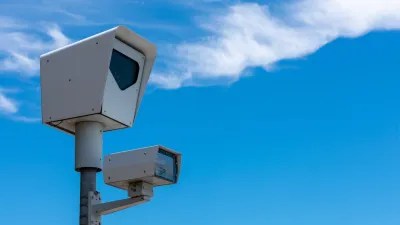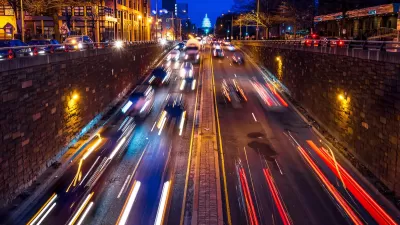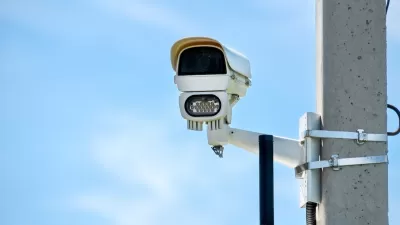A new study finds that as travel speed increases, so too does the likelihood that drivers will fail to yield to pedestrians crossing legally with the right-of-way.
Chris McCahill shares news of a new study published by the Transportation Research Board finding that "drivers traveling at higher speeds are also far less likely to yield to pedestrians in crosswalks." Specifically, the study found that "drivers are nearly four times more likely to yield for pedestrians at travel speeds around 20 miles per hour than at 40 mph."
The study's authors, Tomas Bertulis and Daniel M. Dulaski, observed 100 crossings at nine marked crosswalks, dividing each of them into three groups based on the typical speed of drivers on the road. According to McCahill's explanation of the study: "At 20 mph, roughly 75 percent of drivers slowed enough to let pedestrians cross. That rate dropped to around 40 percent at 30 mph and less than 20 percent as speeds approached 40 mph. The researchers also found that for eight of the sites (excluding the only four-lane street), travel speeds explained 99 percent of the variation in yield rates."
Both McCahill and the study's abstract point out that the study offers ammunition for planners, engineers, and local residents looking to bolster arguments in favor of more stringent speed controls.
Hat tip to Angie Schmitt for sharing the news about the study.
FULL STORY: Drivers more likely to ignore crosswalks at speeds above 30 mph

Manufactured Crisis: Losing the Nation’s Largest Source of Unsubsidized Affordable Housing
Manufactured housing communities have long been an affordable housing option for millions of people living in the U.S., but that affordability is disappearing rapidly. How did we get here?

Americans May Be Stuck — But Why?
Americans are moving a lot less than they once did, and that is a problem. While Yoni Applebaum, in his highly-publicized article Stuck, gets the reasons badly wrong, it's still important to ask: why are we moving so much less than before?

Using Old Oil and Gas Wells for Green Energy Storage
Penn State researchers have found that repurposing abandoned oil and gas wells for geothermal-assisted compressed-air energy storage can boost efficiency, reduce environmental risks, and support clean energy and job transitions.

Minneapolis Bans Rent-Setting Software
Four cities have enacted restrictions on algorithmic software that can inflate rent costs.

Oakland to Add 244 New EV Chargers
Oakland plans to launch its new charging network at eight locations by the end of 2025.

Jane Goodall Inspires with Message of Hope, Resilience, and Environmental Action
Speaking in Pasadena, Jane Goodall offered a hopeful and inspirational message, urging global compassion, environmental responsibility, and the power of individual action to shape a better future.
Urban Design for Planners 1: Software Tools
This six-course series explores essential urban design concepts using open source software and equips planners with the tools they need to participate fully in the urban design process.
Planning for Universal Design
Learn the tools for implementing Universal Design in planning regulations.
Heyer Gruel & Associates PA
City of Moreno Valley
Institute for Housing and Urban Development Studies (IHS)
City of Grandview
Harvard GSD Executive Education
Salt Lake City
NYU Wagner Graduate School of Public Service
City of Cambridge, Maryland





























